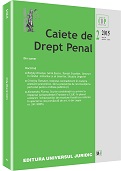Scurte consideraţii cu privire la impactul jurisprudenţei Fransson a CJUE în planul urmăririi infracţiunilor de evaziune fiscală (cu referire ...)
Short considerations regarding the impact of the FRANSSON case before the ECJ in the matter of tax evasion (with special reference to Article 6 of Law
Author(s): Alexandru FloreaSubject(s): Law, Constitution, Jurisprudence
Published by: Universul Juridic
Keywords: decision no. C-617/10; FRANSSON ÅKERBERG; European Court of Justice; non bis in idem principle; Article 50 of the European Convention of Human Rights; Article 4 of Protocol no. 7 of the European Convention of Human Rights; fiscal penalties.
Summary/Abstract: In light of decision no. C-617/10 from 26.11.2013 of the European Court of Justice, it has been decided that applying a fiscal sanction to a person, that through its nature, classification, effects, considering the relevant ECHR case-law, has a repressive character, prevents criminal judicial organs from prosecuting the same person for committing the same acts. In short, the European Court of Justice, being referred to by FRANSSON ÅKERBERG, Swedish citizen, for a preliminary ruling – in the context of criminal prosecution for committing the crime of tax evasion being undergone against him – has decided that, if the defendant had previously been obliged to pay a sum of money additional to the due tax, sum that he also paid, he cannot be criminally prosecuted for the same deed. According to the aforementioned decision, the contrary would lead to the infringement of the non bis in idem principle established by Article 50 of the European Convention of Human Rights and by Article 4 of Protocol no. 7 of the European Convention of Human Rights. The facts withheld by the Court were that the Swedish national had falsely declared his tax base (realised income) for a period of time, thus paying a smaller tax than the one that was due reported to his real income. At the same time, his deed was qualified as aggravated tax evasion under Swedish criminal law. However, it needs to be noted that all the fiscal measures regulated by Swedish law had been taken against Mr FRANSSON, as he was obliged to pay a sum of money equal to 40% of the actual due tax, as sanction, sum that the plaintiff paid. The question is therefore raised in Romanian law if, considering the abovementioned FRANSSON case-law, the non bis in idem principle is infringed if the fiscal penalties described by Article 120 par. 1 of the Fiscal procedural Code are taken against a person, followed by the criminal prosecution of the same deed sanctioned by the fiscal organ. The summarized material concludes that, as long as the fiscal and criminal procedures, regardless of the order under which they are triggered, concern different persons, such as in the case of a legal entity being fiscally prosecuted and a natural person being criminally prosecuted, the non bis in idem principle is not infringed upon, even if the legal entity is administered by the criminally prosecuted natural person. The material further details the consequences of differentiating between the two passive subjects of the two kinds of liability – fiscal and criminal – in the sphere of criminal action, as well as in the sphere of civil action within a criminal trial, in light of the FRANSSON case-law, starting from the definition of the fiscal penalty regulated by art. 120 par. 1 Fiscal code of procedure, with regard to the following hypotheses: the contributor is an authorised person or an individual enterprise and the accused is the same natural person; the contributor is a legal entity and the accused is a natural person.
Journal: Caiete de drept penal
- Issue Year: XI/2015
- Issue No: 02
- Page Range: 62-70
- Page Count: 9
- Content File-PDF

